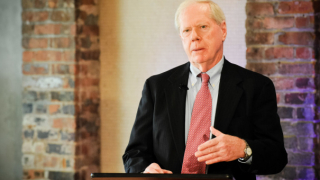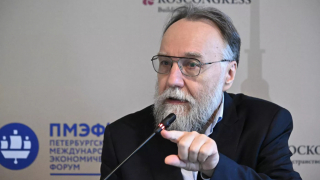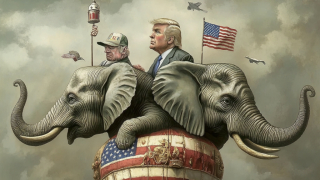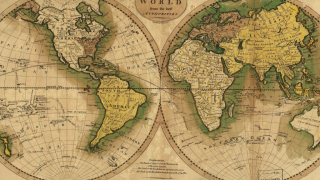The American militarization of Greenland
14.05.2019
The Arctic is becoming an increasingly hot area of discussion among the members of the Arctic Council. Russia, China and the USA are the three strongest countries that have laid eyes on the area mainly due to the economic perspectives in terms of trade routes and natural resources that are becoming available. Greenland, which is part of the Kingdom of Denmark, is again in the limelight as the USA is seeking to get a stronger foothold in the region by investing in the islands infrastructure.
The former CIA Director and current U.S. State Secretary of State, Mike Pompeo, was scheduled to visit Greenland on May 9th in order to discuss shared interests between Denmark and the USA on the Arctic Question. Although he cancelled the trip it is worth looking into the exact reason behind it.
Pompeo has been on a tour through Europe which started with the Arctic Council in Finland on May 7th. At the meeting he lashed out at both Russia and China for trying to secure their national interests in the region – going as far as calling their activities “illegal” (Digges: 7 May 2019). Russia is investing heavily in their North Sea Route as well as in their territory in the Arctic; an area that might become bigger next year as the UN is set to rule on a claim the country has made on the Arctic Shelf all the way up to the North Pole (ibid.). China’s presence in the Arctic stems partly from its research station on the Island of Svalbard as well as its investment in Russian liquefied gas projects in the region. In 2018 China revealed its plans to establish a “Polar Silk Road” which is set to connect with Russia’s North Sea Route.
Besides the geo-economic cooperation between China and Russia in the Arctic, Pompeo stated that “The Pentagon warned just last week that China could use its civilian research presence in the Arctic to strengthen its military presence, including by deploying submarines to the region as a deterrent against nuclear attacks. We need to examine these activities closely, and keep the experience of other nations in mind. China’s pattern of aggressive behavior elsewhere will inform how it treats the Arctic.” (ibid.). It is these comments about possible military-strategic capabilities in the Arctic that brings us to the question regarding American plans for Greenland.
Pompeo’s now cancelled visit to Greenland came in the aftermath of China making efforts to invest in a numbers of airports and an abandoned military base on the island (Politiken: 8th May, 2019). The goal for the USA is to outbid the Chinese offer and effectively stop them from gaining a foothold there while opening the door for heavy U.S. investment into the militarization of Greenland under their control. The U.S. State Department has referred to this move as “a restoration of a permanent U.S. diplomatic presence in Greenland” (Politico: 9th May 2019). It is important to note that the Americans already have one military installation on Greenland; namely the Thule Air Base which was built in 1943.
The Danish government, being a faithful lackey of the USA and NATO, has welcomed this militarization. Prior to the planned visit the Danish Foreign Minister, Anders Samuelsen, stated that: “I am very happy that Pompeo now makes his first visit to Greenland. This visit is a strong signal on the weight the USA lay on the Arctic Question and cooperation with Denmark. The USA is our greatest and most important ally and we have strong common interests. I think we in the coming years are going to see a much broader American involvement in Greenland. This is positive for both Denmark and Greenland.” (Naalakkersuisut: 2nd May 2019). Denmark’s interest in the Arctic therefore rests solely on the whims of the USA. A smarter strategy would have been to seek a broad coalition including both Russia and China in order to ensure that the zero-sum game mentality of America will not lead to an escalation of tension between the active players in the region.
As the race to the Arctic enters a new phase every year as claims by various countries with interest in the region to territory, trade routes and resources gets settled in a diplomatic manner it will be interesting to follow the continued development there. That the American Empire is in an existential crisis is revealed by Pompeo’s accusations and condemnation of Russia and China; two countries which are at the forefront breaking up the unipolar post-Cold War world order. If the Arctic Question will be what will break the camel’s back only time will tell but we pray that the diplomatic quarrels about the future of the cold north will not turn into a hot conflict.
Sources:
Digges, Charles. ”US Secretary of State calls Russia’s Arctic ambitions ‘illegal’” Bellona. Bellona, 7th May 2019. Web. 10 May 2019. https://bellona.org/news/arctic/2019-05-us-secretary-of-state-calls-russias-arctic-ambitions-illegal
“Pompeo cancels stop in Greenland” Associated Press. Politico, 9 May 2019. Web. 10 May 2019. https://www.politico.com/story/2019/05/09/mike-pompeo-greenland-iran-1313121
“USA’s udenrigsminister aflyser grønlandsk besøg i sidste øjeblik” Ritzau. Politiken, 8 May 2019. Web.8 May 2019. https://politiken.dk/udland/art7186690/USAs-udenrigsminister-aflyser-gr%C3%B8nlandsk-bes%C3%B8g-i-sidste-%C3%B8jeblik
“USA’s udenrigsminister Mike Pompeo besøger Grønland den 9. maj) Naalakkersuisut. Government of Greenland, 2 May 2019. Web. 10 May 2019. https://naalakkersuisut.gl/da/Naalakkersuisut/Nyheder/2019/05/020519-Mike-Pompeo-besoeger-Groenland












